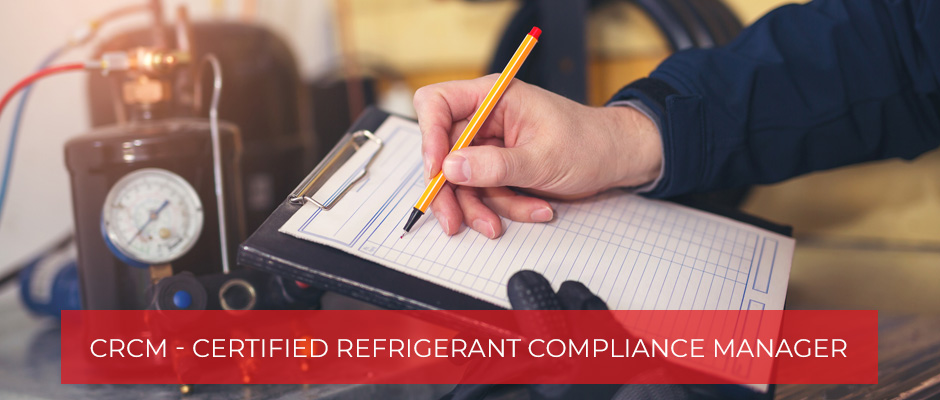CRCM - Certified Refrigerant Compliance Manager Certification is designed recognize a professional’s competence for managing refrigerant compliance within an organization. A CRCM candidate should possess the skills and knowledge to coordinate and manage environmental and safety compliance related to refrigerant purchasing, handling and use, storage, and disposal.

Courtesy of NREP
Who Should Obtain This Certification?
- Environmental Management Professionals: Those involved in overseeing refrigerant-related activities within environmental or facility operations.
- Environmental Personnel: Individuals tasked with ensuring regulatory compliance, managing records, and submitting reports to relevant agencies.
- Facility Operations Staff: Personnel responsible for managing or executing refrigerant-related tasks in line with regulations and maintaining thorough documentation.
- Relevant Roles for CRCM Certification:
- Environmental Managers and Engineers
- Facility Managers
- HVAC Supervisors
- HVAC Contractors
- HVAC Technicians
What Does the Certification Entail?
The CRCM certification offers advanced management-level training and testing to demonstrate proficiency in coordinating, advising, and managing environmental and safety compliance related to refrigerants. With the complex layers of refrigerant regulations, effective communication and coordination across an organization are essential. The CRCM certification serves as a crucial channel for conveying vital compliance information. Key regulatory areas covered include:
- Environmental Protection Agency (EPA) Regulations: Clean Air Act, Title V and VI, Sections 608 and 609
- EPA Programs: National Recycling and Emissions Reduction Program, SNAP Program
- Additional Regulations: The AIM Act, Department of Transportation (DOT), Department of Justice (DOJ), Occupational Safety and Health Administration (OSHA)
Benefits to the Registrant:
- Distinction from Technician Certification: CRCM is not a substitute for the EPA Section 608 Technician Certification, which is necessary for refrigerant recovery and handling.
- Certification Advantages:
- Policy Development: Assist senior management in crafting and implementing comprehensive policies, procedures, and work instructions to ensure adherence to compliance and reporting requirements.
- Role Clarity: Define and clarify responsibilities for both technicians and managers, streamlining operations and ensuring accountability.
- Documentation and Reporting: Establish robust methods for documentation, record-keeping, and regulatory reporting to maintain compliance.
- Communication Enhancement: Facilitate effective communication between technicians and management to ensure seamless operations.
- Compliance Guidance: Provide expert advice on compliance options for systems with leaks, transition planning for refrigerant phase-outs, and adapting to new regulatory challenges.
- Self-Audits and Inspections: Conduct self-audits to ensure ongoing compliance, manage deviation reports for Title V, and efficiently respond to EPA record requests and inspections.
- Reporting Assurance: Confidently prepare and submit annual “Chronically Leaking Systems” reports to the EPA, ensuring accuracy and adherence to deadlines.
Benefits to the Employer:
- Reduced Risk of Non-Compliance: Lower the risk of costly violations and enforcement actions, with civil penalties potentially reaching up to $177,468 per day per violation. Additionally, avoid expensive Supplemental Environmental Projects (SEPs), which can cost millions.
- Enhanced Operational Efficiency: Improve operational reliability, boost efficiency, and minimize waste through effective refrigerant management.
- Clarified Responsibilities: Resolve confusion about responsibilities, including:
- Technicians: Responsible for documenting refrigerant quantities, executing repairs or system modifications, and adhering to regulatory requirements.
- Owners/Managers: Accountable for calculating leak rates, determining necessary repairs or system changes, scheduling verification tests, and maintaining regulatory records.
- Record Keeping: Owners/Managers must maintain detailed records for 3 to 5 years and report to State and Federal agencies.
Why is CRCM Certification Critical for Professionals in the Refrigeration Industry?
The CRCM certification is the only management-level training and certification specifically focused on refrigerant compliance, offering a unique perspective from an owner’s viewpoint. It bridges the gap between environmental regulations and operational management, ensuring that all aspects of refrigerant handling and compliance are addressed comprehensively. Unlike the EPA Section 608 and 609 Technician Certifications, which focus on field personnel handling refrigerants, CRCM training targets the broader responsibilities of facility owners and managers, filling gaps in understanding that can lead to record-keeping issues, missed deadlines, and potential enforcement actions.
Key Features and Benefits of CRCM Certification:
- Cradle-to-Grave Tracking: Ensures that refrigerant management is monitored from installation to disposal, including tracking refrigerant and refrigerant oil throughout the system’s lifecycle.
- Regulatory Compliance Guidance: Translates regulatory requirements into actionable strategies for compliance and maintenance, addressing both legacy and new refrigerants.
- New Refrigerant Challenges: Provides guidance on the safe use and handling of new refrigerants, including considerations for flammability, worker safety, and equipment compatibility.
- Expertise in Transition Planning: Assists in planning for refrigerant phase-outs and transitions, ensuring that new refrigerants meet operational needs and regulatory requirements.
In summary, CRCM certification equips professionals with the knowledge and skills necessary to navigate the complexities of refrigerant compliance, making it an invaluable credential for those involved in both environmental and operational aspects of refrigerant management. It ensures that compliance responsibilities are clearly defined and managed, reducing risks and ensuring effective coordination within organizations.






